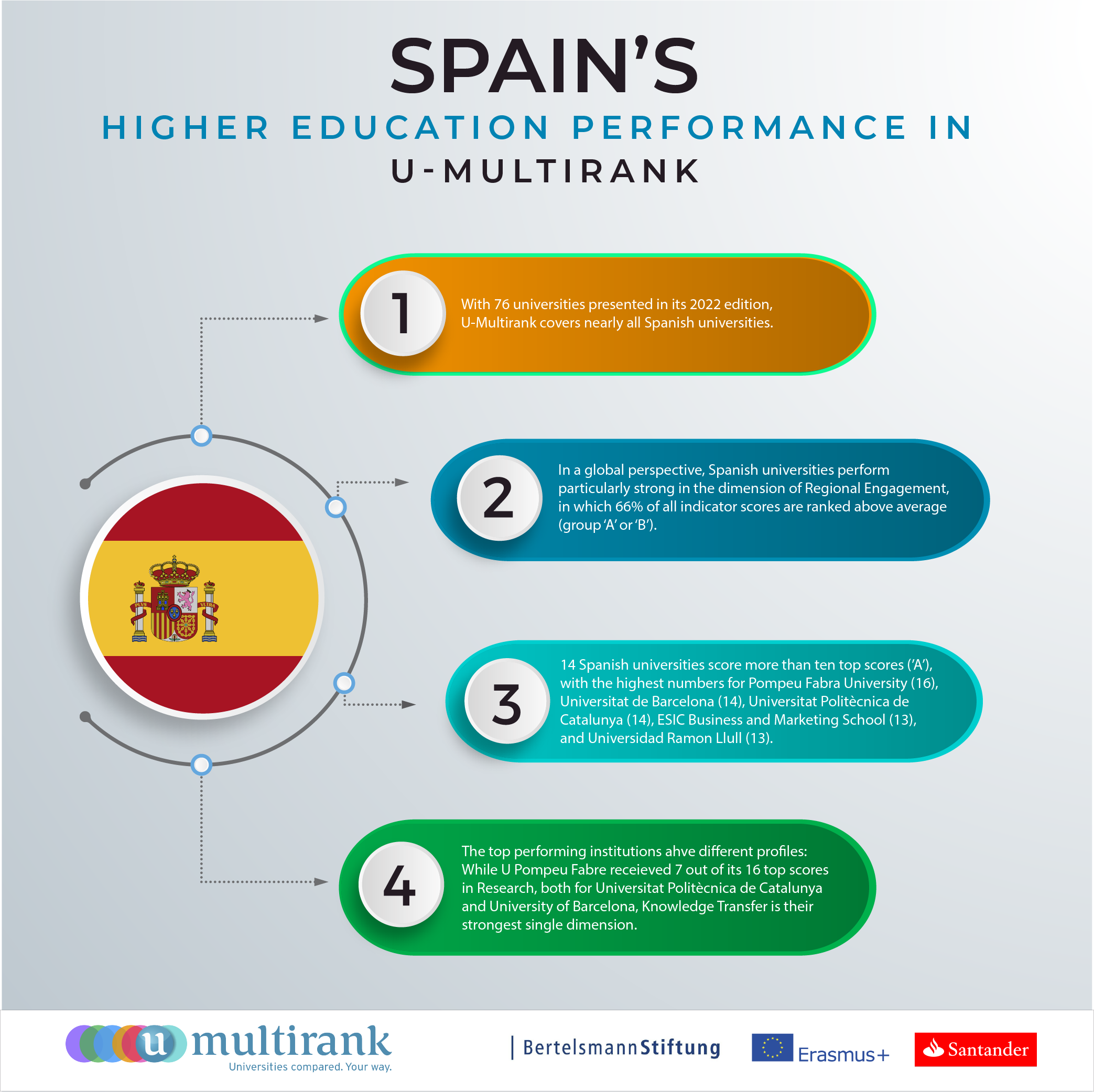How to Study in Spain
Spain is located in south-western Europe and is surrounded by the Mediterranean Sea and the Atlantic Ocean. It is famous for its warm climate and its beautiful cities and landscapes. The largest city and capital of Spain is Madrid. Other great cities that are worth visiting are Barcelona, Valencia, Seville, Bilbao, and Malaga.
Spain’s Higher Education System
As Spain forms part of the European Higher Education Area (EHEA), the country’s study programme is in line with the EHEA’s specifications. This means that the first cycle leads to a graduate degree, equalling 240 ECTS spread out over 4 academic years. Completing the second cycle worth 60 to 120 ECTS within 1 or 2 academic years has you achieve a master’s degree. See below the overall performance of Spanish universities at the institutional level in the 5 U-Multirank dimensions, showing the overall strengths of the country’s Higher Education Institutions. Spanish universities score particularly highly in Regional Engagement.
National performance: Spain
How much does it cost to study in Spain?
A bachelor’s degree education can cost you anywhere between 680 and 1,280 Euros per school year when attending a public university. The amount that it will cost you to attend the university is a fixed amount that is set in place by the Autonomous Community, though the central government can set amounts of tuition costs of schools within their area. Fees for attending a private university to earn a bachelor’s degree vary between 5,500 and 18,000 Euros per school year. For Master’s or Doctoral degrees, university fees at public institutions are also government regulated, and vary between 22 and 36 Euros per credit.
Addition of information on fees and financial support
Source: Eurydice
Reference year(s): 2020/2021
Fees
In this section we highlight the fees for studying in Spain. The fees are shown in the national currency and address all fee types: tuition, enrolment (part- or full-time, etc.), certification, or other administrative costs. Students that are exempt from fees are also described, as well as information on international student fees if they differ.
- The amount of tuition fees is determined by the study field, the level (first- or second-cycle), the number of ECTS taken and the number of times a student has taken each subject. In addition, amounts differ between Autonomous Communities as each one has a different fee range. Each university also charges different administrative and other additional fees. Reductions and exemptions from fees are based on need criteria.
- Short-cycle higher education students are not required to pay any fees in most Autonomous Communities, but they pay fees up to EUR 400 in some.
- International students, defined as non-EU/EEA students, who do not have resident status in Spain may have to pay higher fees, depending on the region.
Source: Eurydice - National Student Fees and Support Systems in European Higher Education – 2020/21.
Financial Support
In this section we highlight the financial support system implemented in Spain. The types of support covered in this section include: grants, loans, tax benefits for students' parents (or students themselves) and family allowances. How these terms are defined, are outlined below:
- Grants are provided in the national currency and are differentiated between merit-based and need-based (or universal, where applicable). All main public financial support that does not need to be paid back is included, with the exception of grants for study abroad (i.e. mobility grants). Information is also presented on the proportion of students (in the short, first and second cycle) who receive grants.
- Loans: information focuses on the existence of a student publicly-subsidised loan system and the percentage of students that take out a loan. Information on the interest rate and modalities for the repayment of loans may also be provided.
- Tax benefit is any tax relief that is granted to parents whose child is a higher education student or to students themselves. The information aims to cover the amount of the tax relief, how it can be claimed and who is eligible to apply.
- Family allowances for students' parents: this part provides information on their amount and the eligible population.
- The national general grant has several components (fixed amounts, a variable amount, a tuition fee grant and an amount linked to academic excellence). Each student, depending on their family income, may receive one or more of the components. These include a fixed amount of EUR 1,700 based on the student’s family income; and a fixed amount of EUR 1,600 for living costs for students living outside the family home during their studies and who also meet certain income criteria. The merit-based component, which can be awarded based on students’ academic performance, ranges from EUR 50 to 125 per year. A variable amount, based on the student’s family income and academic performance is also available; the minimum amount of this is EUR 60, and the maximum amount varies from year to year, since it results from distributing among the applicants the money that is left over after paying all the other components. Full-time students can apply for all components. Part-time students can only apply for the tuition fee grant and the minimum amount of the variable component (EUR 60). Distance education students can apply for the complete variable amount component. An additional component is also aimed at students whose family residence is located in the Canary Islands, the Balearic Islands, or the Cities of Ceuta and Melilla, and whose university is located either in another one of those locations or in mainland Spain. This component ranges from EUR 442 to 937. In addition, short-cycle students also receive a 'basic grant' component of EUR 300.
- 6% of full-time first-cycle and 17.1% of full-time second-cycle students received a grant in 2018/19. All first- and second-cycle students who receive a grant are also exempt from paying fees. However, the grant only covers those ECTS credits that the student takes for the first time (i.e. if a student has to re-take a subject, it will not be covered by the grant the second and subsequent times). Grants are awarded on an individual basis, and therefore each student receives a different amount. However, the average amount for a grant in 2019/20 was EUR 2,160.42 (in addition to an exemption of fees).
- No loans, tax benefits for students' parents or family allowances are in place.
What are the entry requirements for Spanish Universities?
To take up postgraduate studies in Spain, you must hold an undergraduate degree. Should you have obtained that within the EHEA, this enables you to study. Postgraduate programme applicants with a degree from outside the EHEA, you require the positive decision of the university of choice. For those who are in a European country, application submission takes place through the SNUDE, the Spanish National University for Distance Education. The application, called the solicitud de inscripcion, opens during the month of April. Upon completion of the application it should be printed and mailed to the address indicated on the website. You may be asked to submit a copy of a passport, identity card or school leaving certification with the application. If accepted you will receive a Credencial de Accesso within a period of three months. This should be sent to the university in which you want to attend.
How to get a Scholarship in Spain?
No matter the reason, paying high tuition fees can be a source of stress for many. However, there are many options for financing your studies, including the use of scholarships. There are various scholarship opportunities available for international students looking to study in Spain. Depending on your country of origin and the level of studies, there are different options for funding. To explore what scholarship options are available, check this scholarship database.
Do I need a Student Visa for Spain?
As an EU/EEA/Swiss citizen, you do not require a visa, no matter the length of stay. For you, it is enough to have a valid national ID or passport in order to enter the country. However, if you wish to take up your studies in Spain and they take longer than 90 days, you will be required to register with the local authorities - in addition to your valid acceptance and registration documents of your Spanish university. Third country nationals need a student visa if you wish to study for more than 3 months. For studies taking 6 months or more, you are also required to obtain a residence permit. Lastly, you also need to show you have sufficient funds as well as a health insurance for the duration of your stay.
How do Spanish Universities fare in U-Multirank?
- With 76 universities presented in its 2022 edition, U-Multirank covers nearly all Spanish universities.
- In a global perspective, Spanish universities perform particularly strong in the dimension of Regional Engagement, in which 66% of all indicator scores are ranked above average (group ‘A’ or ‘B’).
- 14 Spanish universities score more than ten top scores (’A’), with the highest numbers for Pompeu Fabra University (16), ESIC Business and Marketing School (15), Universitat Politècnica de Catalunya (14), Universitat de Barcelona (14) and Universidad Ramon Llull (13).
Here you can find the current Spanish country report.

What to study in Spain?
Where to study in Spain?
Consumer Basket
Main course
11.00 €
Drinks
2.50 €
One-way ticket
1.40 €
Cinema ticket
8.00 €
Useful vocabulary
Hello
Hola
Bye
Adiós
Thanks
Gracias
Please
Por favor
To compare Spanish universities in Spanish, visit our partner company Fundación CYD:





